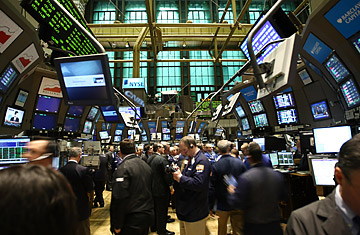
Traders are seen on the trading floor at the opening bell at the New York Stock Exchange in New York City.
Is the stock market rally over? Up through Thursday's close, stocks were up 21% over two weeks, a gain fueled by positive news from the moribund housing market, an uptick in durable goods orders, and a well received plan from Treasury Secretary Timothy Geithner to clean up the banking industry's toxic-asset mess. (Read "Banks: How Toxic Are They?")
But investors got cold feet on Friday, and sent the Dow down 1.87%. The broader S&P 500 index fell 2.03%, with 84% of its stocks moving lower. One bit of good news: Friday's decline occurred on relatively light trading volume, and was not surprising given that stocks had risen so far in a short time. Yet a decline is still a decline, and the sharper sell off in financial stocks, which were down 3.4% on Friday, raises questions about the many challenges the industry — and the broader market — still face.
Ironically, what helped start the rally in mid March were upbeat words from Citigroup CEO Vikram Pandit about Citigroup's profitable performance during the first two months of 2009. Friday's stock market swoon, traders say, was partly triggered by cautious comments from Bank of America CEO Ken Lewis and JP Morgan Chase CEO Jamie Dimon, who both noted that March was proving to be a more difficult month than either January or February. As Dimon told Bloomberg TV while standing outside the White House after a group of bankers met with President Obama, "This downturn — it's pretty powerful stuff."
But the stock market is not so much a news processor as a leading economic indicator, and today's loss notwithstanding, big investors may be betting on better news around the corner. "If you believe as I do that we'll be coming out of recession by year end, then this is about the time you would expect to see the start of a cyclical bull market," says Stephen Leuthold, president of Leuthold Group in Minneapolis, a firm with $5 billion in assets. Leuthold has studied stock markets and recessions going back to 1860. "We found that in all but two instances, the stock market began to recover about 50% to 60% of the way through the recession. I'm optimistic right now."
Several tests of investor optimism will come in the weeks ahead, as U.S. companies begin reporting first quarter earnings (or losses). Moreover, the U.S. Treasury will probably make public the results of the bank stress tests that it has conducted in recent weeks. If stocks perform well in the face of bad quarterly numbers, or mixed news on the stress tests, market analysts will take that as a strong indicator that investor sentiment is truly turning.
Right now, says Leuthold, institutional investors are moving back into stocks, not because they're confident of a recovery, but because they're loathe to miss an important market move. "The pension funds are way below their actuarial assumptions, and they're afraid they'll be left behind if they sit with too much cash," he says. In other words, performance fears could replace recession fears.
